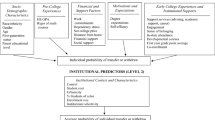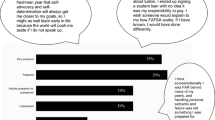Abstract
Withdrawal from college can be a positive step toward separation from parents and identity formation. Subjects for the present study were all persons who withdrew from a random sample of 432 members of a large freshman class (154 males and 278 females). Subjects were divided into withdrawers versus continuers, with the former group being subdivided into transfers versus nontransfers and withdrew passing versus withdrew failing. All subjects were compared in terms of their responses to a freshman orientation questionnaire and a follow-up interview. The results indicate that both male and female withdrawers as a total group were significantly more dissatisfied with their lives (p<0.05 andp<0.025, respectively) at the time of admission than were continuers Follow-up results also suggest that many of the withdrawers left college and were able to deal with their dissatisfaction in creative ways. Transfers versus nontransfers, as well as withdrew-passing versus withdrew-failing students were also significantly different from each other along several dimensions at the time of admission. The findings have implications for administrators and researchers.
Similar content being viewed by others
References
Chickering, A. W. (1969).Education and Identity, Jossey-Bass, San Francisco.
Cope, R. G., and Hewitt, R. G. (1971). Types of college dropouts: An environmental press approach.College Student J. 5: 46–51.
Curtis, J. R., and Curtis, T. E. (1966). A study of dropouts at the University of North Carolina.J. Am. Coll. Hlth Assoc. 14: 140–146.
Erikson, E. (1959). Identity and the life cycle.Psychol. Iss. No. 1.
Farnsworth, D. L. (1969). College dropouts.Rhode Island Med. J. 52: 209–210, 217.
Gadzella, B. M. (1967). Factors influencing students to withdraw from college.Coll. Student Survey 1: 55–60.
Goetz, W., and Leach, D. (1967). The disappearing student.Personnel Guid. J. 45(9): 883–887.
Goodman, P. (1970).New Reformation, Random House, New York.
Hackman, J. R., and Dysinger, W. S. (1970a). Reactions to college withdrawal.J Exper. Educ. 38: 23–31.
Hackman, J. R., and Dysinger, W. S. (1970b). Research notes: Commitment to college as a factor in student attrition.Sociol. Educ. 43: 311–324.
Harris, H. I. (1966). Case report: Drop-out and negative institutional transference.Am. J. Psychother. 20: 664–668.
Hirsch, S. J., and Keniston, K. (1970). Psychosocial issues in talented college dropouts.Psychiatry 33: 1–20.
Janowitz, J. F., and Allen, D. A. (1966). Withdrawal from college for severe psychiatric disturbance.J Am. Coll. Hlth Assoc. 14: 301–304.
Levin, S. (1967). Some group observations on reactions to separation from home in first-year college students.J. Am. Acad. Child Psychiat. 6: 644–654.
MacKinnon, D. W. (1963). Identifying and developing creativity.J. Secondary Educ. 38: 166–174.
Max, P. (1969). How many graduate?College and Univ. 45: 63–76.
McIntosh, B., Wilson, L. N., and Lipinski, B. G. (1974). The extent and nature of student attrition in the first five years at Simmon Fraser University.Canad. Counsellor. 8(3): 163–174.
Mock, K. R., and Yonge, G. (1969).Students' Intellectual Attitudes, Aptitude, and Persistence at the University of California, Center for Research and Development in Higher Education, Berkeley, Calif.
Newcomb, T. M., Koenig, K. E., Flacks, R., and Warwick, D. P. (1967).Persistence and Change: Bennington College and its Students After Twenty-Five Years, Wiley, New York.
Pervin, L., Reik, L., and Dalrymple, W. (eds.) (1966).The College Dropout and the Utilization of Talent, Princeton University Press, Princeton, N.J.
Pope, R. V. (1931).Factors Affecting the Elimination of Women Students from Selected Coeducational Colleges of Liberal Arts, Teachers College, Columbia University, New York (Cited in Jellison, B. D. (1965). Certain differences in two groups of dropouts at Fort Hays Kansas State College: With recommendations for reducing attrition among students with good academic potential. Unpublished doctoral dissertation, University of Colorado.)
Summerskill, J. (1962). Dropouts from college. In Sanford, N. (ed.),The American College, Wiley, New York, pp. 627–657.
Thistlewaite, D. (1963).Recruitment and Retention of Talented College Students, Office of Education, Washington, D.C.
Timmons, F. R. (1977a). Freshman withdrawal from college: An empirical examination of the usefulness of “autopsy studies.”Psychol. Rep. 41: 672–674.
Timmons, F. R. (1977b). Incidence of withdrawal from college: An examination of some misconceptions.Percept. Motor Skills 45: 651–654.
Author information
Authors and Affiliations
Additional information
This article is based on the author's doctoral dissertation.
Received his Ph.D. from the University of Colorado. Current interests are adolescent and adult personality and psychopathology.
Rights and permissions
About this article
Cite this article
Timmons, F.R. Freshman withdrawal from college: A positive step toward identity formation? A follow-up study. J Youth Adolescence 7, 159–173 (1978). https://doi.org/10.1007/BF01537523
Received:
Issue Date:
DOI: https://doi.org/10.1007/BF01537523




